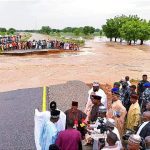Flood Destroys 5 Benue Communities

Mr Emmanuel Shior, the Executive Secretary, Benue State Emergency Management Agency (BSEMA), while briefing newsmen in Makurdi on Wednesday disclosed that the rampaging flood has submerged five communities in Agatu and other parts of Makurdi, the state capital.
Shior also added that Rice Mill and other settlements on the banks of River Benue were also affected. He said that the state government had taken proactive measures, including setting up a committee to sensitise the people of the state on the dangers ahead. He also disclosed that the committee consists of officials drawn from SEMA, Ministry of Water Resources, Ministry of Information and other stakeholders in the state.
Shior said that SEMA, in conjunction with NEMA and other stakeholders, had embarked on an awareness campaign in the media, churches and Mosques.
He said that the campaign was intended to encourage residents of flood-prone areas to relocate to safer areas.
The BSEMA boss said that the latest check with a gauge showed that the water level at the River Benue had risen to 11 metres, barely one meter to its maximum level.
According to him, the water has virtually reached the level that caused flooding in 2012, during which most parts of the state were submerged.
He advised residents to steer clear from the river because of the high level, saying that 12 metres was the highest level that could cause disaster in any state.
He said that centres in the state, including the International Market, had been prepared to accommodate displaced persons.
In his remark, Mr Lugard Slaku, the Zonal Coordinator of the National Emergency Management Agency (NEMA) for North Central, said that 12 states, including Benue, had been listed as most threatened by flood in the country.
“So we have come with a team trained by NEMA to collaborate with SEMA to assess the situation, check the available facilities and gaps and report back to the head office for additional resources, where needed,” Slaku said.
Slaku said that while NEMA, SEMA and other stakeholders were working hard to ensure prompt response to distress calls, the people must cooperate with the government to prevent avoidable disaster.









